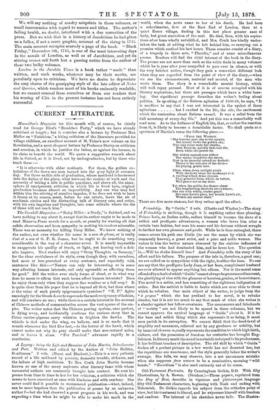The Cornhill Magazine. — " Daisy Miller : a Study," is finished,
and we have nothing to say about it, except that its author ought to be made to read Minerva-Press novels for a month, as penalty for wasting all that subtle observation and keen sympathy in making his readers miserable. There was no necessity for killing Daisy Miller. We know nothing of the author, not even whether his name is a none de planes, or is really that of a son of G. P. R. James, but he ought to do something very considerable in the way of a character-novel. It is nearly impossible to exaggerate his quality of touch, so light, yet leaving such a defi- nite impress. Most readers will enjoy "Stray Thoughts on Scenery," for the clear restfulness of its style, even though they, with ourselves, feel more or leas provoked at every sentence, and especially with sentences like this :—" Nature can only be interesting as in some way affecting human interests, and only agreeable as affecting them for good." Did the writer ever study forms of cloud, or in what way does he mean to affirm that such forms affect human interests? Does he enjoy them only when they suggest fine weather or a fall crop ? It is quite clear from his paper that he is beyond all that, but then where is the value of such purely epigrammatic cynicism ? "E. P." fights amusingly for the Greek dress to supersede the modern tyranny of fashion, and will convince no one ; while there is a certain interest in the account of Chinese methods of communication across the vast spaces of the em- pire. The writer notes that the Chinese posting system, once perfect, is dying away, and incidentally confirms the curious story that in China carrier-pigeons carry whistles to frighten the hawks. The whistle is tied under the wing, we believe, and is so made that it sounds whenever the bird flies fast,—to the horror of the hawk, which cannot make out why its prey should make that non-natural noise, and so leaves it alone. "For Percival " advances rapidly to a conclusion.


































 Previous page
Previous page